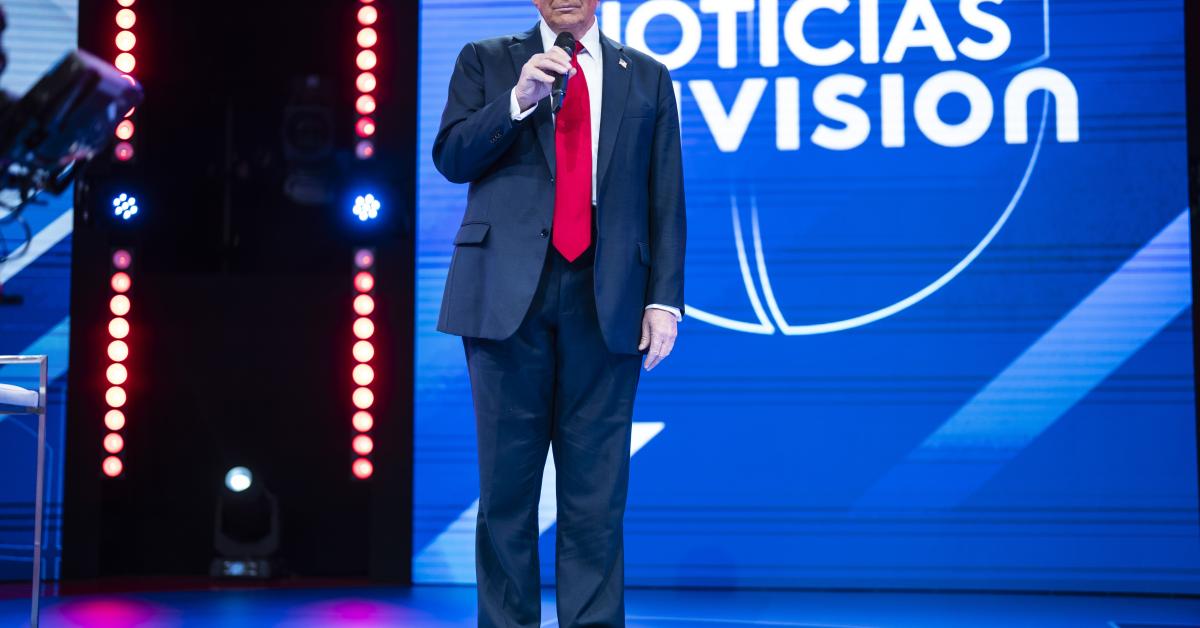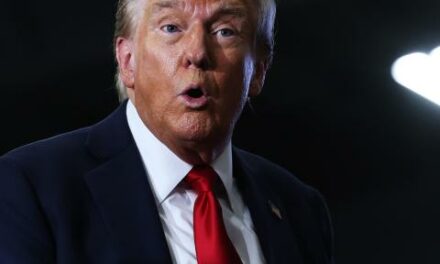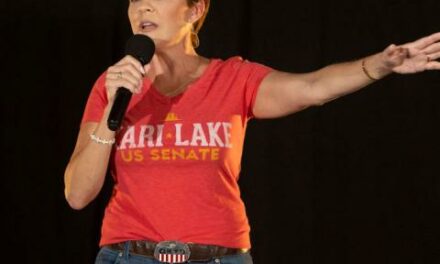We support our Publishers and Content Creators. You can view this story on their website by CLICKING HERE.

Just a month into his new job, Univision CEO Daniel Alegre has already watched his network host both major candidates for townhalls with undecided Hispanic voters and he tells Just the News he has made one unequivocal observation about America’s fastest growing electoral bloc: “The world of 15 years ago, where Hispanics were essentially considered a vote for the Democratic Party, that’s no longer the case.”
Alegre made the comment during a wide-ranging interview with the “John Solomon Reports” podcast where he also laid out his vision for the world’s largest Spanish language television network. “You know, the Hispanics are really becoming more and more an issues vote, than a specific party vote.”
He noted that the “Republican Party has made very significant inroads relative to previous years in the Hispanic community. You know, the gap has always been much more Democrat leaning, and that that is significantly decreased over the last few years,” especially with male voters.
Change in Hispanic electorate
“I’m not trying to sound overly dramatic, but I fundamentally believe that the Hispanics are going to decide who the next president of the United States is going to be,” Alegre said. “And if you look at just the battleground states, for instance, the number of Hispanic voters in each of those battleground states is by a factor of about 10, higher than the difference between winning and losing each state.”
You can listen to the full interview here:
The change in the Hispanic electorate parallels a change in Univision’s own arc as it prepares for a post-cable television world with new streaming products and targeted digital advertising capabilities, and a major change in its newsroom, where longtime anchor Jorge Ramos is retiring after reigning supreme for decades while raising distrust among conservatives who believed he leaned to the left.
Univision has made a concerted effort to open corporate lines of communications to the top of both Donald Trump’s and Kamala Harris’s campaigns in addition to its usual newsroom interactions. That has created new opportunities for making friends and exchanging learnings about how to engage one of the most dynamic blocs of voters today.
In addition, Univision commissioned a survey conducted by a Latino polling company tied to longtime Trump pollster John McLaughlin that garnered national headlines, revealing that the GOP nominee’s support among Hispanic voters had surged a whopping 17 points since the 2020 election. Those findings have been affirmed by internal polls by campaigns and other polling outlets that reveal a marked shift to the right by Hispanic voters, who now comprise about 13% of the total vote expected to be cast in the Nov. 5 election.
“Policy issues matter”
The poll also revealed Hispanic voters had clear issues driving their 2024 decisions that were also aligned with Trump: 26% identified the economy/jobs as the most important issue, while a 13% chose immigration and the border. Kamala Harris two signature issues – abortion and climate change – were lower priorities, the poll found.
Under Alegre’s predecessor Wade Davis, Univision conducted similar surveys among its viewership, which revealed a much more evenly divided Hispanic electorate concerned about the insecurity of the border and their own communities, the impact of illegal immigrants on the job market and the loss of buying power due to inflation, according to documents reviewed by Just the News.
Alegre said the polling should be a driving factor in how political campaigns court Hispanics going forward, with increased daily conversations about policy and issues. He noted that while Hispanics account for 13% of expected voters, political spending on Hispanic language media was likely to reach only 2% of the total. He added that a quarter of Hispanic voters remain undecided just a week before the election,
Candidates need to show they are “able to talk to this community on a consistent basis about the things that matter, the policy issues that matter,” Alegre said.
“We know that the No. 1 issue, you know, is inflation and the impact of inflation on the standard of life. Then security and safety, which is obviously tied to the to the whole immigration question,” he said. “Those are absolutely pivotal. And you know these town halls showed that if you show up and you talk to the community, they will listen and they will appreciate and you can change their minds.”
He cautioned both parties to avoid showing up in the final days of the election then abandoning such conversations in the months after ballots are cast.
“What really matters thereafter is a consistency, a consistency of engagement with our community to ensure that you’re speaking to them in their language, on the platforms that they’re used to and that they trust. And this goes obviously way beyond the elections next week, it’s a long term engagement that I think is important to focus on.”
Mexican-born Alegre, also said political parties often seek to limit their appearances on Univision to their Spanish-speaking politicians but that engagement with non-Spanish speaking officials was also key. He noted that the Harris and Trump townhalls had seamless translations that did not impact the quality of viewing or the flow of programming. He encouraged others to follow suit.
“I want my Hispanic community to be fully informed and vote their conscience. But the other part is, it goes beyond Nov. 5. You know, this is, this is a short, medium and long term game for a community that is only going to keep getting stronger and stronger and the consistency of engagement will pay dividends way beyond Nov. 5,” he added
Alegre is a seasoned Big Tech executive who made his mark in the early Google franchise and then ran the gaming giant Activision during an era of great expansion on social media. He assumed the helm at Univision just a month ago.
He said Univision’s growth into digital platforms – it already has two streaming giants – will continue to transform passive viewing into interactive engagement.
“I’ll tell you where I think things are moving: for sure, the digital platforms and being able to have content on demand and personalized to what you really care about. You know, that’s clearly going to be a trend, but there’s still a lot of opportunity in the linear space. And you know, sports, for instance, we are known as the home for soccer, and people will always going to keep coming back to television, the main network for it,” he said.”
People can interact more socially
“Where it really becomes exciting is when you can actually bring all those various pieces together where you consume content, whether it’s on a on a TV screen or connected TV or on your iPad, but then you can actually interact much more socially with the content thereafter, and that means whether it’s a shorter, shorter clips that that you can share with friends, or bringing chat capabilities, you know, influencers, and bringing the influencers into the mix that makes things so much richer as an overall experience for the consumer,” Alegre said.
He added a personal wish to the strategy. “I want to bring the Hispanic community together, whether it’s through our content, whether It’s through our informational content in news,” he explained. “It’s ensuring that our community is connected, is heard and is informed in the right way so they can make decisions that is best for themselves and for their families.

 Conservative
Conservative  Search
Search Trending
Trending Current News
Current News 





